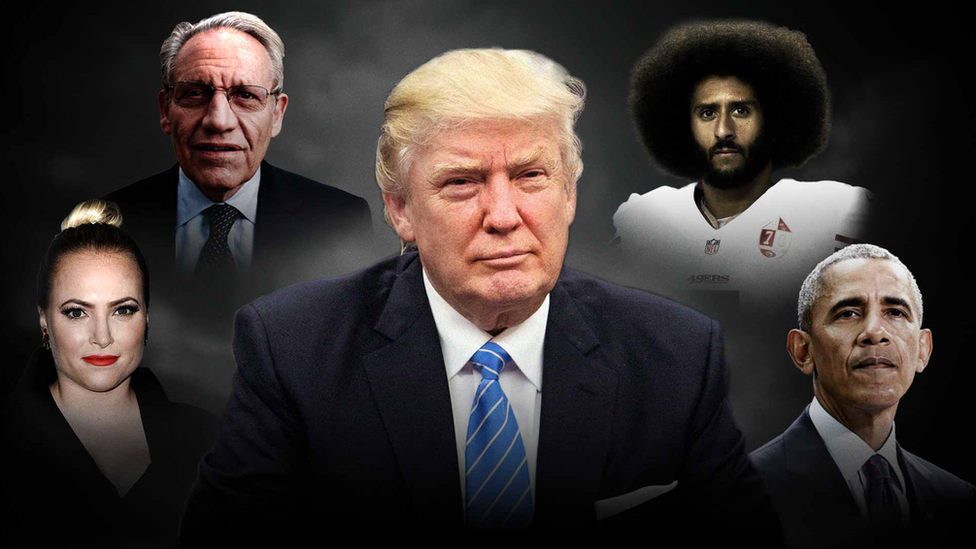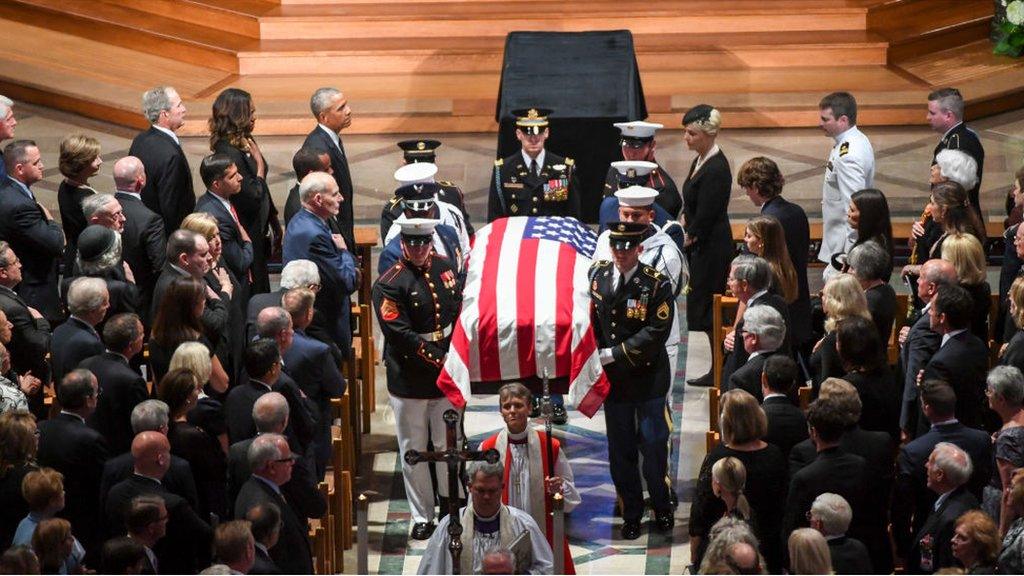Resurgent anti-Trump 'resistance' defines a divided America
- Published

September is emerging as a month of defiance, a milestone moment in the Trump presidency when the forces of 'the resistance' are asserting themselves more strongly.
The Labor Day holiday usually ushers in a change in the political seasons. This year, however, it has been the confluence of separate but interlocking events.
The national commemorations following the death of John McCain. The publication of the latest Bob Woodward blockbuster. The anonymous op-ed penned by a senior administration official for the New York Times. The protests on Capitol Hill during the hearings for Trump's Supreme Court nominee, Brett Kavanaugh. Even the launch of the latest Nike advertising campaign featuring Colin Kaepernik, the African-American NFL star who began the kneeling protest.
In protesting the Trump presidency, it is as if all the oppositional forces across the country have decided that enough is enough and that this is the moment to "Just Do It".
These seven days in September have certainly felt historic. The eulogies of Barack Obama and George W Bush at Washington National Cathedral last Saturday were not only intended to pay tribute to John McCain but also to reaffirm cherished American values.
Meghan McCain, speaking with the power of grief, sought to redefine what is meant by American greatness - "the real thing", as she so scathingly put it, "not cheap rhetoric from men who will never come near the sacrifice".
Meghan McCain and ex-presidents gave eulogies for a man "defined by love"
The rituals of mourning before that memorial service were also freighted with meaning. The appearance of the White House chief of staff John Kelly and the Defence Secretary James Mattis alongside Cindy McCain as the funeral cortege stopped off at the Vietnam war memorial looked like an attempt to reassert the norms of national life, following the incivility of the flag controversy and President Trump's meagre and grudging expression of respect for a one-time POW whom he refused to call a war hero.
John McCain, as others have written, had intricately choreographed his final farewell as a rebuke to Donald Trump. What was striking, however, was the willingness of those who spoke and those who applauded from the pews to play the roles he assigned them. In that sacred setting of the National Cathedral, this seemed to be a concerted congregational attempt to redeem the soul of America.

The atmosphere in the American capital, so solemn that day, changed with manic suddenness when the Washington Post published the first excerpts from Bob Woodward's new book, Fear. Not since the early days of the Bill Clinton scandal involving Monica Lewinsky has the mood here been so feverish.
But while the mood changed, the Woodward revelations were a continuation of this September story of resistance. Washington's chronicler-in-chief, a journalistic star of Watergate, described "an administrative coup d'etat": of administration officials secretly trying to subvert the president by hiding key policy documents and disregarding orders.
If the Woodward book felt like a hurricane ripping through town, the anonymous New York Times column struck like a late-afternoon tornado. "I am Part of the Resistance Inside the Trump Administration." The headline alone was jaw-dropping. The piece that followed was extraordinary.
Then Barack Obama book-ended the week with his strongest public criticism of the president so far, lambasting him for not attacking white supremacists and neo-Nazis in Charlottesville, and accusing his administration "of crazy stuff". After the speech, the Republican National Committee labelled Barack Obama the resister-in-chief.
Nazis, demagogues and conspiracy theories - three Obama attacks on Trump
For all this epic drama, the country is not facing a constitutional crisis, as the former Secretary of State John Kerry claimed in midweek.
The branches of the US government, the executive, legislative and judicial, are not in dispute. Constitutional dysfunction is not the issue here. And soon Americans themselves will be able to exercise their own constitutional check and balance, their right to vote in the mid-term elections.
That political showdown in November will pit Trump resisters against Trump loyalists. The irony is the Democratic leadership does not want to turn the mid-terms into a referendum on the president or to explicitly make the argument that winning back the House of Representatives is the first step towards impeaching him.
In the Senate, the Democrats are defending 10 seats in states that Mr Trump won in 2016 - places such as North Dakota, West Virginia and Wisconsin, where Mr Trump remains popular. On the House side, the election will be decided in suburban swing seats by moderate voters, who do not always respond to the more strident anti-Trump rhetoric of the left. For the Democrats, it makes sense to localise the mid-term elections rather than federalise them.
The events of these seven days in September will galvanise Donald Trump's base supporters. Polls after his death suggested that John McCain was more popular among Democrats than Republicans. In that memorial at the National Cathedral, they would have seen the Washington establishment at prayer honouring one of its own.
They will interpret the Woodward book and New York Times article as the liberal media working in tandem with the establishment - even what Mr Trump calls "the deep state" working to subvert him.
Trump calls senior official's anonymous editorial 'gutless'
The headline event this week for Trump's evangelical supporters is that Brett Kavanaugh looks to be heading for the Supreme Court bench, giving it a more firmly conservative majority.
In what feels more and more like a climactic struggle, the divide between the two Americas - the country that rallies around Mr Trump, and the country repulsed by him - is being rendered more starkly.
The cheers for the president at his heartland rallies are louder than ever. And so are the howls of protest and resistance.
- Published3 November 2017
